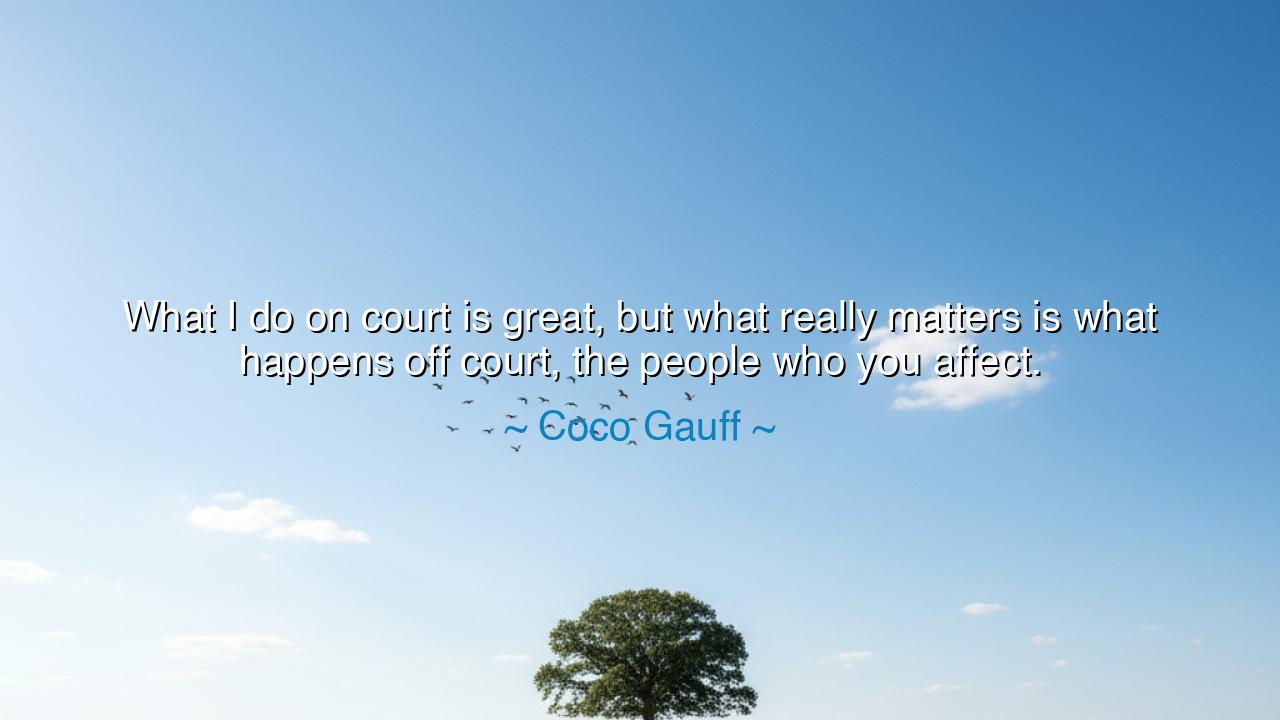
What I do on court is great, but what really matters is what
What I do on court is great, but what really matters is what happens off court, the people who you affect.






“What I do on court is great, but what really matters is what happens off court, the people who you affect.” Thus spoke Coco Gauff, the young prodigy of tennis, whose grace extends far beyond the boundaries of the game she plays. In these words, she unveils a wisdom that many only find at the dusk of life — that true greatness lies not in performance, but in impact, not in the roar of the crowd, but in the quiet legacy of kindness, character, and influence we leave behind. For skill may bring applause, but compassion brings meaning; trophies may shine for a season, but goodness endures for generations.
The origin of this quote comes from the lips of a champion whose youth belies her depth. Coco Gauff, who rose to international fame when she defeated her idol, Venus Williams, at just fifteen years old, quickly became more than an athlete. She became a symbol — of courage, humility, and purpose. As her fame grew, she began to understand that victory on the court was not the summit, but the starting point. Her words, spoken in interviews after her triumphs, reveal a heart that sees sport as a platform for service — that recognizes the measure of a person lies not in what they achieve alone, but in how their achievements lift others.
Her reflection carries the ancient wisdom that the world’s greatest souls have long proclaimed: that the true hero’s journey does not end in the battlefield, but continues in the choices made after victory. In the ancient world, Alexander the Great conquered vast empires, but even he found that conquest without compassion left emptiness behind. In contrast, Marcus Aurelius, the philosopher-emperor, wrote that what defines a man is not power or glory, but virtue — the ability to live rightly, to do good, and to care for others even when the world looks away. Gauff’s words are born of this same truth: that greatness divorced from humanity becomes hollow.
In sports, as in life, the temptation is to believe that the game is everything — that the pursuit of excellence justifies all things. Yet Gauff reminds us that the game is merely a mirror for the soul. How one competes reflects who one is, but how one treats others reveals who one becomes. There are athletes whose records are unmatched, yet whose legacy fades because their hearts remained closed. And there are others, like Arthur Ashe, who used his fame not for pride, but for purpose. Ashe, who broke barriers in tennis decades before Gauff, once said, “Start where you are. Use what you have. Do what you can.” He fought for equality, dignity, and education, and in doing so, proved that the true victory is not in sport, but in service.
Gauff, walking in this same lineage, has used her voice to speak on justice, youth empowerment, and hope. She has reminded young people that kindness is a greater legacy than medals, and that every platform, no matter how grand or small, can be used to make the world better. Her humility is her power. In an era that glorifies ego, she stands as one who knows that fame fades, but influence endures. This understanding transforms her from an athlete into a messenger — one who carries the eternal truth that character is the crown of greatness.
Her quote also teaches a lesson that applies to all, not just champions. Each person has a “court” — a place of labor, art, or purpose — where they strive to excel. But as Coco reminds us, what truly matters happens off the court: in how we treat our neighbors, in the love we show to our families, in the kindness we extend to strangers. You may never hold a trophy, but you hold in your hands the power to uplift others, to inspire hope, to heal wounds unseen. Every word, every gesture, every act of goodness ripples outward, affecting lives you may never know.
Therefore, O seeker of purpose, take this wisdom as your own: pursue excellence, but never forget empathy. Strive for greatness in your craft, but let your heart be greater still. When you win, lift others. When you lose, remain gracious. Measure your worth not by your accomplishments, but by the warmth you leave in others’ lives. For in the end, as Gauff reminds us, it is not the score that is remembered, but the soul behind the score — not the record, but the ripple.
And so let this truth ring within you: what you do on your court — your work, your art, your stage — is great. But what truly matters is the world you touch beyond it. Be fierce in your pursuit, but gentle in your spirit. Live not only to succeed, but to serve. For long after the applause has faded, the kindness you give will still echo — the quiet proof that your life, like Coco Gauff’s, was played not just to win, but to make others better for having witnessed it.






AAdministratorAdministrator
Welcome, honored guests. Please leave a comment, we will respond soon